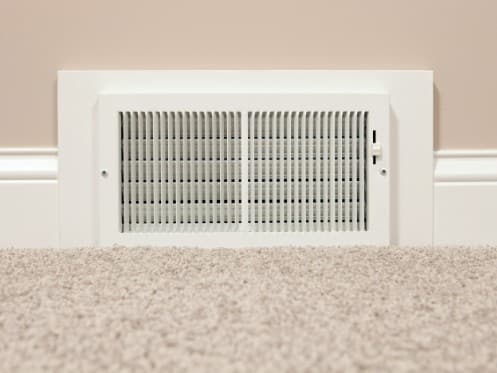Quality air conditioners don’t come cheap. In Bonita Springs, FL, residential cooling equipment represents a significant investment for most homeowners, and with good reason. Summers are long, hot, humid, and often downright oppressive. The good news is that you can extend the lifespan of your AC, increase its efficiency, and ensure reliable and consistent operation with routine filter changes.
Regularly inspecting and swapping air filters out will have a major impact on your home comfort, spending, and indoor air quality (IAQ). Read on to find out why and to learn how often you should perform this basic but essential maintenance task.
What AC Air Filters Do
When you turn your air conditioner on, its indoor air handler pulls warm air from the interior of the building, passes it over its refrigerant-filled evaporator coil, and then funnels back into the living environment after its heat has been absorbed. The many particulates floating around your home can get pulled into this system. Unfortunately, even light accumulations of dust, dander, and pet hair can diminish the efficiency of these units by inhibiting the heat transfer process.
AC air filters come pre-installed in new air conditioners. AC manufacturers put these components in to protect the interior of cooling systems from build-ups of debris. AC air filters keep evaporator coils relatively clean until air conditioners are professionally serviced. Although HVAC technicians clean evaporator coils during annual tune-ups, these and other components would become far too dirty if no air filter existed.
By installing AC air filters and recommending that homeowners change them regularly, equipment manufacturers extend the lifespans of their products and stave off a host of maintenance-related problems.
AC Manufacturer Recommendations for Filter Changes
Recommendations for AC air filter changes vary from brand to brand. In general, homeowners are advised to inspect these components monthly and to change them every 30 to 90 days. To find out what the brand-specific recommendations are for your air conditioner, check your owner’s manual for instructions on filter care, read through your manufacturer’s warranty, or ask one of our technicians.
Equipment Manufacturer Warranties and Filter Change Requirements
A lot can go wrong if you run your air conditioner when its filter is dirty. For instance, debris-covered evaporator coils will eventually ice over when the frosty refrigerant they contain is unable to absorb heat. Worse still, air conditioners struggle throughout all portions of the cooling cycle as drawing new indoor air becomes increasingly challenging.
All incoming air must move through the thick build-ups of textile and carpet fibers, lint, dust, and other particulates that collect on these components. These airflow obstructions force cooling systems to work harder and use more energy.
When AC manufacturers issue equipment warranties, they agree to cover the costs of all repairs and replacements caused by defective parts or workmanship. However, understanding the stress that air conditioners are subjected to when operating with dirty filters, they stipulate that homeowners must change these components on a regular basis.
In fact, some equipment manufacturer warranties state specific, required schedules for filter changes. Because warranties are mutually binding agreements, you stand to lose your warranty protections if you skip filter changes altogether or neglect them for too long.
How Warranties Are Voided When Homeowners Skip Filter Changes
Some homeowners think that equipment manufacturers will never know when they’ve skipped filter changes. However, there are always tell-tale signs of filter neglect. Even if your next AC repair issue is due to a defective part, you could wind up paying for it out of pocket. This could happen if your equipment manufacturer ever discovers that there are large accumulations of debris trapped behind your HVAC air vents.
This is also the case if debris is lodged in your ducting, or on and under the unit’s evaporator coil. It’s important to note that filter neglect can additionally impact the AC coverage that’s provided by your home warranty and your home insurance plan.
Assessing Your Indoor Air Quality Concerns
Not every household needs filter changes every one to three months. For instance, you might rarely run your air conditioner, live alone, don’t have any indoor pets, and live in a low-traffic neighborhood with fairly high outdoor air quality. If so, you might need filter changes just once every six months when your HVAC equipment is serviced. However, before delaying filter changes, it’s best to get a professional opinion first.
In other instances, even changing filters once each month is not enough. This may be the case if your home is:
- Located near a busy highway or freeway
- Close to an airport
- Next to an active construction site
- Filled with rambunctious pets
- On a lot that hasn’t been formally landscaped
All of these factors add various allergens and contaminants to the indoor air that are both harmful to residents and detrimental to air conditioners’ sensitive, interior parts. There may be households with pets and homes with residents who suffer from chronic respiratory ailments. If so, it’s often best to inspect AC air filters every two to three weeks and change them monthly or more often. Ultimately, the more IAQ concerns you have, the more often your AC filter needs changing.
Upgraded AC Air Filters
Some air filters last a bit longer than others. Every HVAC air filter sold throughout North America is assigned a maximum efficiency reporting value (MERV) rating. MERV ratings run from one through 20, with one being the lowest possible MERV rating and 20 being the highest. Standard HVAC air filters have MERV ratings between six and eight. These filters have simple, pleated designs, and some are just one inch thick. If you’re using a low-cost, entry-level filter like this, you should inspect it every three weeks and change it every three to four weeks.
Filters with MERV ratings between 10 and 12 have tighter mesh, a better ability to pick up micro-fine contaminants, and larger surface areas. With greater surface area for holding collected debris, some upgraded air filters only need replacing every three to six months.
How to Inspect an AC Air Filter
Depending upon the type of air conditioner you own, you’ll likely find its filter in the indoor air handler or just near your thermostat in a return HVAC air duct. You can refer to the owner’s manual for your cooling equipment to help you find it. This manual should give you a clear idea of what your filter looks like, how to remove it, and how to put it back in correctly.
If you’re removing your air conditioner’s filter for the very first time, pay careful attention to its orientation before pulling it out. For filter changes to be effective, new filters must be correctly sized and oriented.
After you’ve removed an existing air filter, hold it up to the light. When filters get dirty, they usually have thick, lint-like mats of debris or dusty, dark-colored build-ups. If light from your overhead fixture can still pass through your AC air filter, there’s a good chance that air can, too.
Contact the Professionals
We help residents in Naples, FL take good care of their heating and cooling equipment. Plumbing, Cooling & Electrical Nerds offers air conditioner and heating maintenance, installation, and repair services. We also provide plumbing, sewer line repairs, and drain cleaning. To find out about our referral program or schedule an appointment, contact Plumbing, Cooling & Electrical Nerds today.

